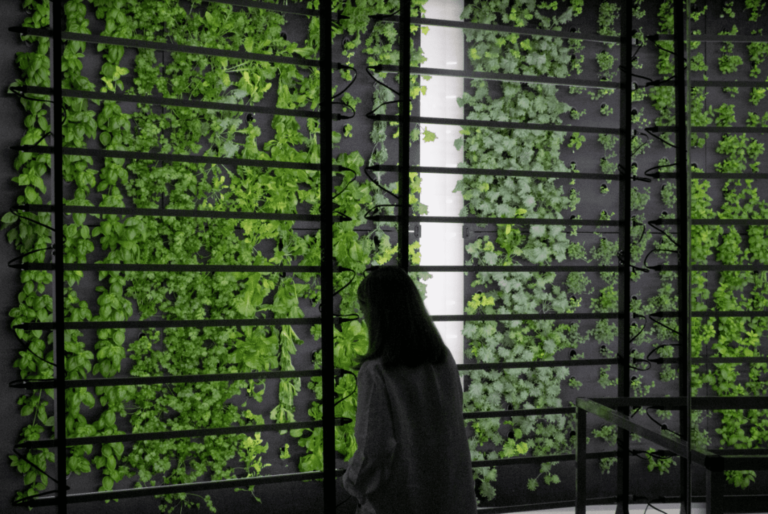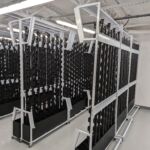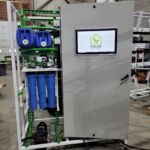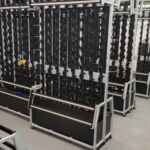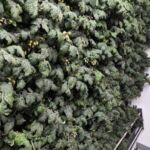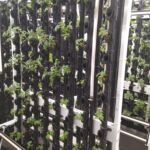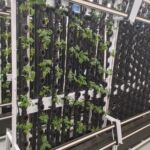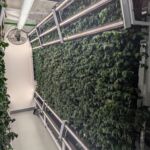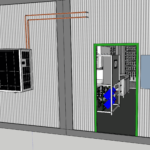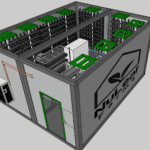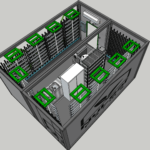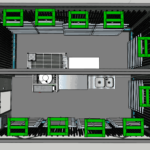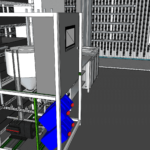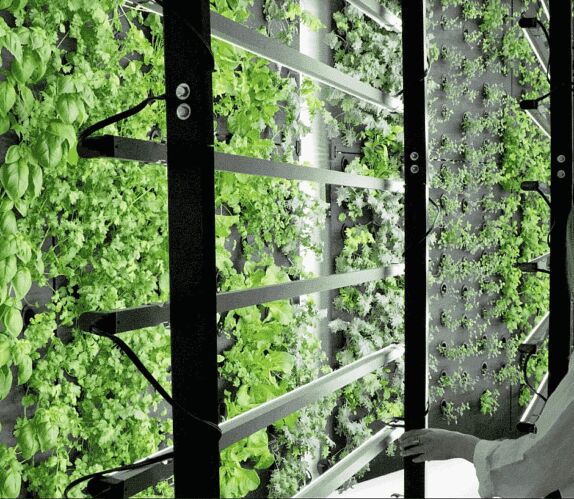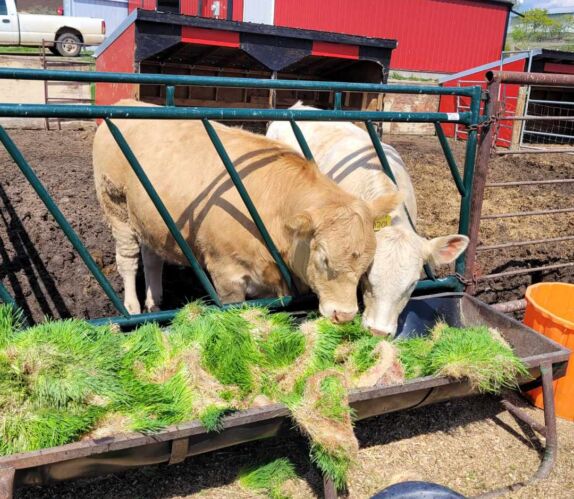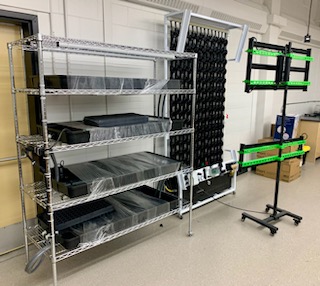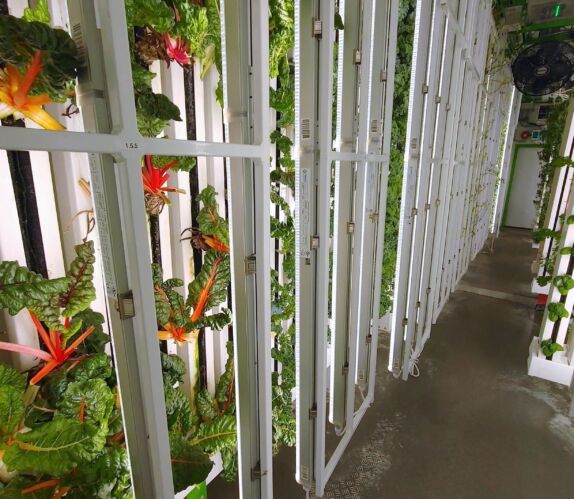Grow Over 4,000 Crops Year-Round — Designed for Performance, Built for Growth
At NuLeaf Farms, we’re transforming the way food is grown. Our 20′ x 16′ Vertical Produce Farm is an advanced, fully integrated hydroponic system designed to empower growers, entrepreneurs, and communities to cultivate premium leafy greens and herbs year-round, in virtually any climate or location. With over 4,000 plant ports, state-of-the-art environmental control, and a streamlined workflow design, this farm is your blueprint for success in sustainable agriculture.
Built for flexibility, efficiency, and long-term profitability, this system provides the essential infrastructure to scale local food production while significantly reducing labor, water use, and operating costs. Whether you’re launching a commercial farm, food security initiative, or educational program, this system provides a future-proof solution to meet growing food demand and climate resilience challenges.
Key Features at a Glance
-
4,000+ Plant Ports support dense vertical production of leafy greens like romaine, kale, chard, bok choy, arugula, spinach, and specialty crops such as basil, cilantro, mint, dill, and parsley. With the right crop strategy, your farm can yield multiple harvests per month, drastically improving ROI.
-
Advanced 4-Zone Leaf Controller gives you total control over microclimates and crop recipes. Manage light schedules, humidity, nutrient delivery, and more with one easy-to-use platform—perfect for optimizing diverse crop zones or scaling up to meet growing demand.
-
Spacious 20’ x 16’ Layout ensures growers can move freely while working, planting, harvesting, and packaging. Unlike narrow shipping containers, our farm layout is engineered for workflow efficiency, staff safety, and ergonomic comfort.
-
Energy-Efficient LED Grow Lighting ensures each crop receives the ideal spectrum and intensity for its growth stage, enhancing flavor, appearance, and yield while minimizing power usage.
-
Fully Integrated Systems for HVAC, fertigation, irrigation, lighting, air quality control, and pest prevention. All systems are seamlessly managed through a unified automation system that supports precision growing.
-
Nursery Racks, Work Tables, and Centralized Work Station create a complete farm ecosystem under one roof—streamlining planting, seedling propagation, crop rotation, and harvest logistics.
-
Factory-Prepped and Field-Tested so you can go from delivery to first planting in record time. Every unit is built for durability, efficiency, and ease of use.
-
Includes a 1-Year Root Contract, giving you real-time access to analytics, technical support, crop recipe updates, and performance optimization tools developed by NuLeaf’s expert agronomists and farm technicians.
Maximize Yield Without Compromising Space
This hydroponic farm packs the power of a full-scale greenhouse into a compact, modular footprint. By stacking plants vertically, you can grow 4,000+ crops simultaneously—ideal for dense urban areas, institutional rooftops, or retrofitted industrial spaces. With faster crop cycles and year-round production, you can meet local demand for fresh food while building a scalable business model.
Vertical growing means you don’t need to compromise on output just because space is limited. With NuLeaf’s vertical racks and optimized airflow, each plant receives balanced light, water, and nutrients, allowing you to consistently harvest nutrient-rich, flavorful produce that meets market demands for freshness and quality.
Precision Farming Powered by The Leaf
Take full control of your farm’s performance with The Leaf, NuLeaf’s proprietary Crop Manager system. Featuring a visual dashboard and zone-based controls, this system automates your workflow from seed to harvest. Easily plan and manage multiple crop types, receive growth projections, and track zone-specific performance metrics in real time.
With crop recipes, growth timelines, and harvest dates built into the interface, you’ll always be several steps ahead of your operation. Whether you’re a beginner or an experienced grower, The Leaf helps you stay on schedule, improve crop quality, and adapt to changing production needs with minimal downtime.
Optimize Every Square Foot with The Root
Included with your farm is a 1-Year Root Contract, NuLeaf’s advanced digital support system. The Root connects your farm to a network of expert tools, dashboards, and specialists who help maximize your farm’s performance. From crop planning and environmental monitoring to AI-driven optimization, The Root ensures your operation is always data-informed and results-driven.
Track your inputs, manage inventory, and monitor key performance indicators such as yield, operating costs, and sustainability metrics. The Root also pushes updates directly to your Leaf controller, giving you access to the latest crop recipes, automation upgrades, and support services. With this integration, you can reduce labor hours, improve output quality, and ensure your farm performs at peak efficiency every day.
Built for Growers — Designed for Humans
Unlike shipping container farms, which often sacrifice comfort for size, our 20’ x 16’ layout was built with human performance in mind. Ample space for workers to move around safely and efficiently improves productivity, sanitation, and morale. The farm includes dedicated nursery racks for germination and propagation, large work tables for harvesting and processing, and clean design lines that support easy sanitation and standard operating procedures.
This modular unit can be expanded or retrofitted to suit educational programs, food hubs, commercial kitchens, or institutional cafeterias. With thoughtful design and commercial-grade durability, this unit performs well in high-volume, high-stakes environments.
Sustainability Meets Profitability
NuLeaf’s vertical farms are engineered to reduce the environmental footprint of traditional agriculture. Each system uses up to 90% less water, completely eliminates the need for chemical pesticides, and can operate on renewable energy systems to minimize carbon emissions. With year-round production capability, you can maintain consistent harvests while slashing transportation costs, spoilage, and food miles.
By growing locally, you build resilience into your food system, support food sovereignty, and reduce your dependence on global supply chains. Whether you’re in an urban center or a remote region, this farm model brings fresh, nutritious food closer to the communities that need it most.
Get Started Today with NuLeaf Farms
The 20′ x 16′ Vertical Produce Farm is more than a product—it’s a comprehensive platform for high-performance, sustainable food production. Backed by decades of experience, smart technology, and hands-on support, NuLeaf ensures your farm isn’t just productive—it’s profitable.
If you’re ready to lead the future of local food production, NuLeaf is here to help you grow from seed to success.
Technical Specifications
| Feature | Details |
|---|
| Size | 20 ft long x 16 ft wide |
| Grow Capacity | 4,000+ plant ports for leafy greens, herbs, and select specialty crops |
| Climate Zones | 4 independent zones controlled by The Leaf Crop Manager |
| Lighting | High-efficiency LED grow lights, adjustable spectrum and intensity |
| Environmental Controls | HVAC, fertigation, irrigation, air quality, humidity, and temperature |
| Automation | Smart automation through The Leaf system |
| Optimization Suite | The Root: Real-time monitoring, analytics, crop planning, and alerts |
| Included Tools | Nursery racks, planting tables, monitoring displays, nutrient delivery kit |
| Installation | Factory pre-configured and production-ready |
| Support | 1-Year Root Contract with ongoing updates and expert consultation |

